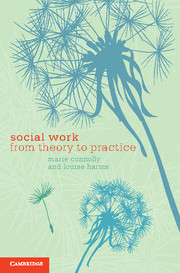Book contents
- Frontmatter
- Contents
- List of figures
- Preface
- Acknowledgements
- 1 Social work knowledge, theory and practice
- 2 Frameworks, models and practice
- 3 Ecosystems theories
- 4 Onion-peeling theories
- 5 Faulty-engine theories
- 6 Story-Telling Theories
- 7 Mountain-moving theories
- 8 Reflective practice and theory
- Concluding thoughts
- References
- Index
- References
2 - Frameworks, models and practice
- Frontmatter
- Contents
- List of figures
- Preface
- Acknowledgements
- 1 Social work knowledge, theory and practice
- 2 Frameworks, models and practice
- 3 Ecosystems theories
- 4 Onion-peeling theories
- 5 Faulty-engine theories
- 6 Story-Telling Theories
- 7 Mountain-moving theories
- 8 Reflective practice and theory
- Concluding thoughts
- References
- Index
- References
Summary
TO SUGGEST that social work theory and empirical research necessarily informs and strengthens practice underestimates the difficulties in bringing together conceptual and practical endeavours. Building linkages between theory, research and practice has been a long-standing challenge in social work. Busy practitioners have little opportunity to keep abreast of new research, and the higher-order nature of some theories and perspectives means that they lack straightforward translation into practice. As a consequence models of practice have emerged from theoretical ideas. These function as bridges between broader theoretical ideas and intervention strategies within daily practice. For example, empowerment perspectives (see chapter 7) do not provide a tractable practice pathway, yet the Family Group Conference is a good example of a practice model that can trace its roots to the empowerment tradition (Connolly 1999). This is an example of a practice model emerging from theoretical concepts and ideas. When theory, knowledge and practice come together in this way the result becomes part of a rich and continually evolving intellectual tradition within social work. Connolly and Healy (2009: 32) note the integrative potential of accessible frameworks for practitioners in their day-to-day work: ‘Based on research findings, “good practice” principles and natural justice for clients, practice frameworks provide clarity with respect to understanding the critical aspects of the social work task, and the means through which knowledge can influence intervention pathways.’
- Type
- Chapter
- Information
- Social WorkFrom Theory to Practice, pp. 24 - 46Publisher: Cambridge University PressPrint publication year: 2011



